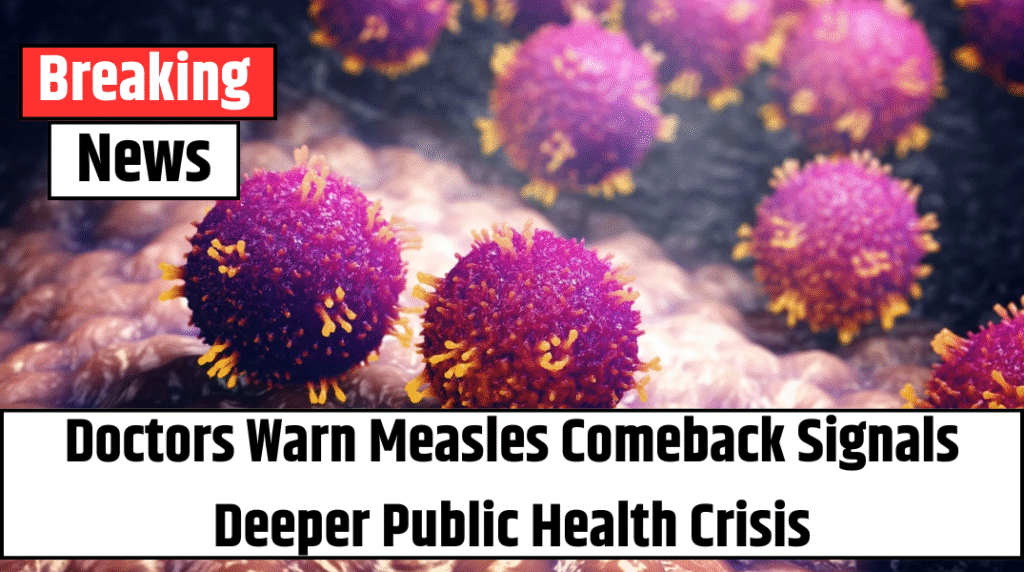A newly published perspective in New Microbes and New Infections warns that without swift public health action, the U.S. could lose its two-decade status as a country free of endemic measles. As outbreaks multiply and vaccine uptake falters, measles—among the most contagious diseases on Earth—is threatening to reclaim ground.
A Surge Unlike Any in Recent Memory
By April 2025, the CDC had already logged 884 confirmed measles cases across 29 states. Just two months later, that number ballooned to 1,197, nearly surpassing the record set in 2019, which had previously been the highest since measles was declared eliminated in the U.S. in 2000.
Texas remains the epicenter, reporting 646 cases, with Gaines County alone accounting for 393 infections—more than any other state. New Mexico follows with 65 cases, most of them concentrated near the Texas border. Tragically, three deaths have been reported, including two children and one adult, all unvaccinated.
Most shocking, 90% of U.S. measles cases this year are linked to large-scale outbreaks, highlighting sustained local transmission that experts say could re-establish measles as endemic if left unchecked.
Beyond the U.S.: A Global Wake-Up Call
The domestic crisis mirrors troubling international trends. In Europe, measles is surging with over 56,000 cases across 41 countries in just one year, according to the ECDC. Kazakhstan, Romania, and other Eastern European nations are bearing the brunt, with thousands hospitalized and at least five fatalities reported.
Also Read – Republican Plan to Slash Medicaid Sparks Fears of Setbacks in Red States
In Africa, not a single country has achieved elimination. Many countries continue to battle under-vaccination, unstable health systems, and ongoing outbreaks. These global trends reflect not just lapses in policy but growing distrust in vaccines.
What’s Driving the U.S. Spike?
Contrary to some political narratives, immigration is not the primary driver. Instead, public health officials say the current crisis is largely homegrown—a direct result of domestic under-vaccination.
In 2023, only 92.7% of U.S. children received both required MMR doses, falling short of the 95% threshold needed to maintain herd immunity. This leaves millions vulnerable—especially in homeschooled populations, religious enclaves, and undocumented communities that are often overlooked in standard reporting.
Gaines County, for instance, has one of the lowest vaccination rates in Texas, with a large Old Colony Mennonite population that maintains conservative, insular traditions. These communities often face language and access barriers to healthcare, which, combined with mistrust, creates a perfect storm for outbreaks.
Similar outbreaks have been seen in recent years among Orthodox Jewish communities in New York, the Amish in Ohio, and unvaccinated groups in California—each fueled by skepticism and cultural isolation.
A Legacy of COVID Mistrust
The COVID-19 pandemic’s ripple effects continue to poison public health efforts. Routine vaccinations plummeted during lockdowns, and public discourse around vaccines became deeply polarized. Misinformation spread online—often amplified by political actors—has eroded trust in science, even among parents who once followed immunization schedules without question.
At the same time, undocumented immigrants, already marginalized, face greater challenges to access healthcare: fear of deportation, lack of insurance, and limited access to culturally appropriate information all keep vaccination rates dangerously low.
Measles: More Than a Rash and Fever
Many forget that measles is not a benign childhood illness. Beyond its signature rash and high fever, it carries serious complications: pneumonia, encephalitis (brain swelling), and a suppressed immune system that can persist for years—a phenomenon known as “immune amnesia.”
Also Read – Justice Department Sends Threatening Letters to Medical Journals
This means even after recovery, individuals can become more vulnerable to other infections, raising community-wide risk.
A Path Forward: Empowering Doctors, Respecting Communities
Healthcare providers are essential in reversing vaccine hesitancy. Instead of punitive policies that alienate families, experts recommend consistent, empathetic conversations that build trust over time.
“Refusing care to vaccine-hesitant families isn’t effective,” said one pediatrician in West Texas. “But listening, educating, and staying respectful works—eventually.”
The MMR vaccine schedule recommends doses at 12 and 60 months, with flexibility for early vaccination in outbreak settings. Yet in many communities, vaccine access remains secondary to cultural or religious norms. That’s why public health strategies must evolve.
One promising model? Faith-based outreach programs—as seen in India—where trusted religious leaders help advocate for immunization. Similar efforts could be tailored for Mennonite or Amish communities in the U.S., especially in outbreak zones.
What’s at Stake
If nothing changes, the U.S. may lose its measles elimination status by the end of 2025. Measles, once used as a poster child for vaccine success, now serves as a “canary in the coal mine,” warning of deeper vulnerabilities in a fractured public health system.
This isn’t just about measles—it’s about the broader erosion of vaccine confidence and the growing politicization of science.
The researchers behind the new perspective piece emphasize that what we’re seeing now could be just the beginning. Without renewed public trust, targeted local outreach, and sustained funding, measles might be the first of many preventable diseases to make a dangerous comeback.
Also Read – FDA Approves Injectable Lenacapavir in Major Step for HIV Prevention
What You Should Know:
-
Measles is airborne and highly contagious — a single infected person can infect 9 out of 10 unvaccinated people around them.
-
97% of current U.S. cases are unvaccinated.
-
Texas and New Mexico are at the center of the current outbreak.
-
Vaccine uptake is dropping — not just due to access, but due to ideological and cultural resistance.
-
The U.S. could lose its measles elimination status this year if outbreaks persist.



